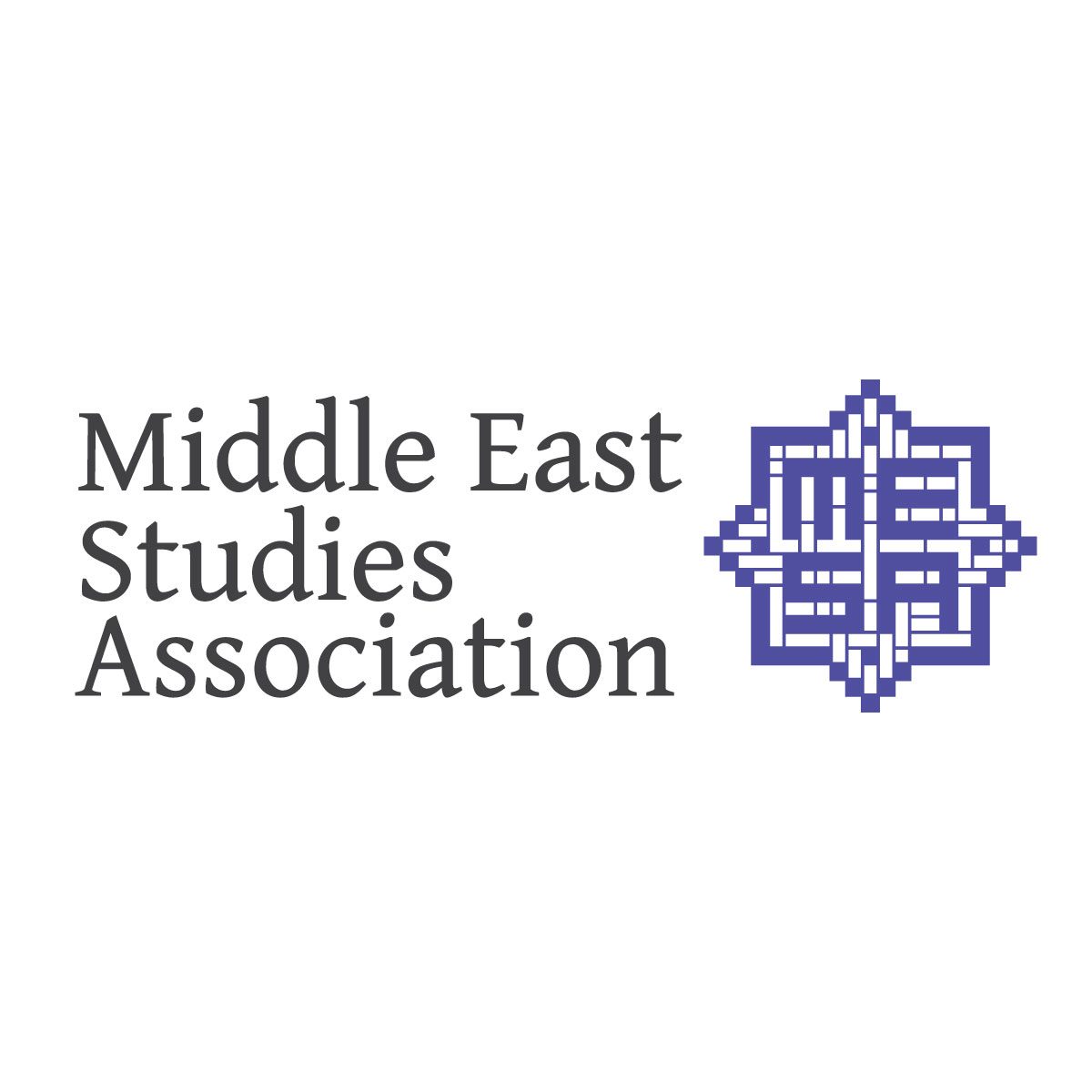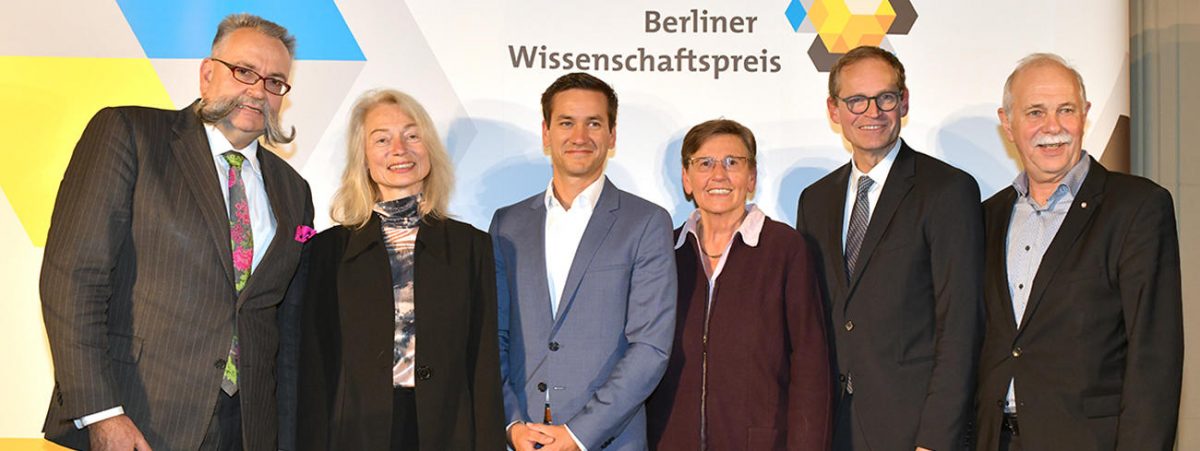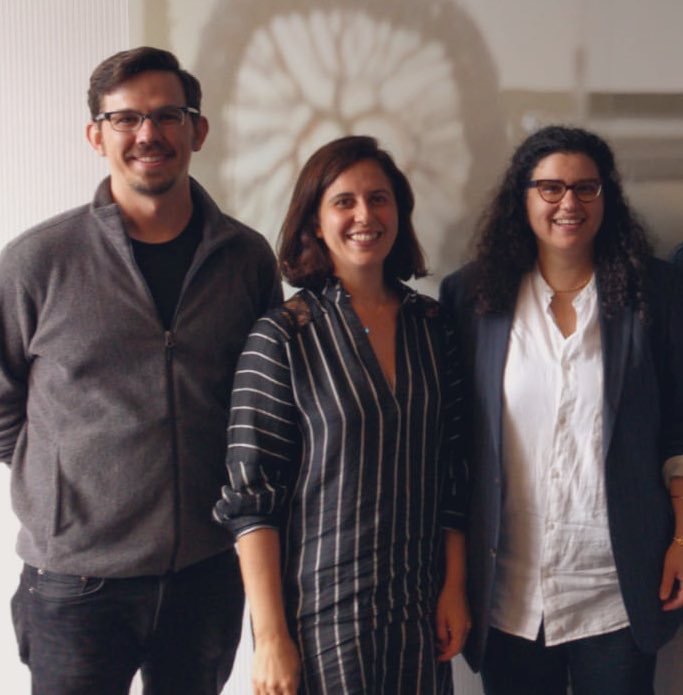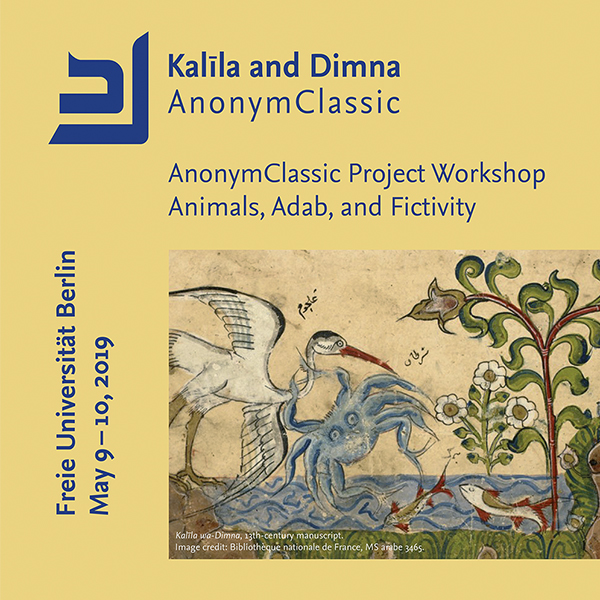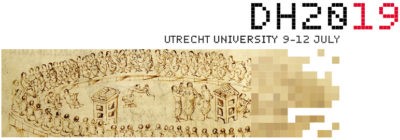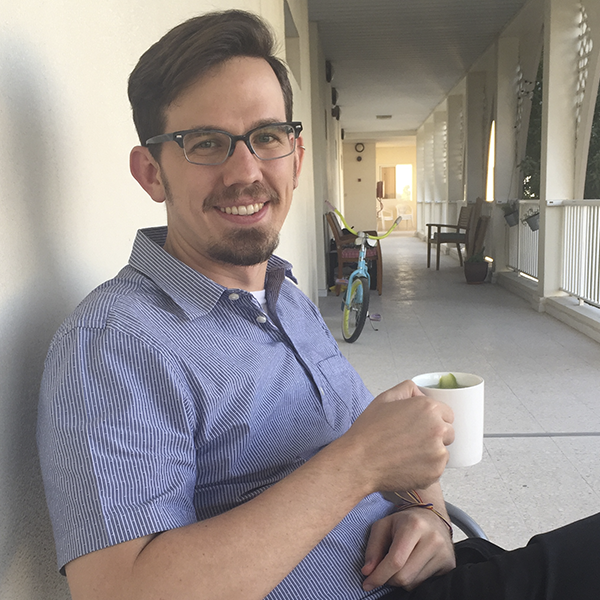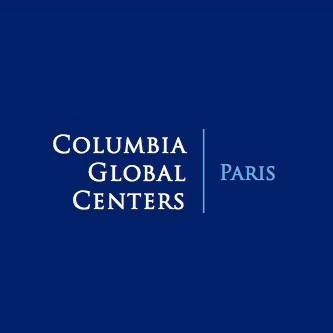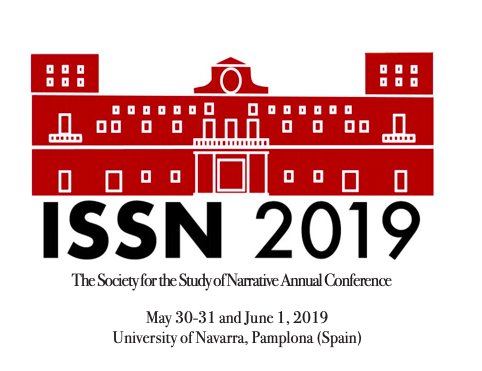At the MESA annual meeting 2019 within the panel on The Arabic Vernacular, team member Johannes Stephan presented findings from his research on early modern Arabic manuscripts and their literary features. Among the texts discussed he displayed a 17th-century copy from the Kalīla-wa-Dimna tradition (Sbath 267) written by an anonymous Christian scribe. The text contains conspicuous, yet regular Middle Arabic features which suggest both an elaborate knowledge of literary standards and a program for the text’s oral use. The rich Kalīla-wa-Dimna tradition with dozens of copies from the 17th to 19th centuries can serve as a robust basis to rethink Middle Arabic as a historical idiom with artistic implications.
Author: Victoria Mummelthei
Prof. Dr. Beatrice Gruendler awarded with the Berliner Wissenschaftspreis 2019
We are feeling fantastic and we congratulate!
Prof. Dr. Beatrice Gruendler, Professor of Arabic Language and Literature at the Seminar for Semitic and Arabic Studies and PI of our ERC project Kalīla and Dimna – AnonymClassic, was awarded the Berliner Wissenschaftspreis 2019 for her excellent research on Arabic literature and for her contribution to a sophisticated discourse on Arab-Islamic culture, said Berlin’s Governing Mayor Michael Müller.
Below a selection of articles and press releases:
La visite de Bibliothèque Nationale de France
Le 10 Octobre 2019, Prof. Béatrice Gründler, moi même et ma collègue Mme. Rima Redwan avons visité la bibliothèque nationale de France, Rue de Richelieu, où nous avons pu consulter une quinzaine de manuscrits de la version arabe de Kalīla wa-Dimna, dont cinq sont illustrés. Parmi les manuscrits consultés, le Paris Arabe 3465 daté du 13ème siècle et jugé être le plus ancient manuscrit arabe illustré de Kalīla wa-Dimna.
Cette occasion nous a permit de voire ces oeuvres et de pouvoir examiner de plus près l’état des manuscrits, la qualité du papier, la mise en page, le type de relire utilisé ainsi que beaucoup d’autres éléments relevants à notre étude.
Dans l’après-midi nous avons eu l’occasion avec tous les participants à la journée d’étude ”Textual criticism of mediaeval Arabic geographic texts” d’assister à un workshop de deux heures dirigé par Mme. Marie-Geneviève Guesdon, la chargée des manuscrits arabes à la bibliothèque nationale de France où nous avons consulté deux manuscrits de Kalīla wa-Dimna, un en langue arabe daté du 14ème siècle et un en persan de Anvar i- Suhayli ainsi que deux manuscrit de l’ouvrage géographique de al-Istakhri.
La journée d’étude
Le 11 Octobre 2019, s’est tenue au sorbonne une journée d’étude intitulée:”Textual criticism of mediaeval Arabic geographic texts”. Cet événement qui a été organisé par Mme. Nadja Danilenko de la Freie universität de berlin, Mr. Jean-charles Ducène de l’école pratique des hautes d’études et Mr. Peter Verkinderen membre du projet Kitab situé à Aga Khan university à Londres. L’événement a eu lieu dans la salle Gaston Paris au sorbonne du 9h30 jusqu’a 17h.
La journée d’étude était articulée en trois sessions. La session d’ouverture a été entamé par Mr. Jean-charles Ducène qui nous a parlé des défis et des enjeux de la réalisation d’une édition à l’aide d’une présentation intitulée “Quand les traditions manuscrits rendent caduques les éditions existantes.”
Par la suite, Mme. Nadja Dailenko nous a parlé des travaux de al-Istakhri, un géographe médiéval persan à travers une deuxième présentation intitulée:” Same same but different. The Persian translations of al-Istakhri’s work in the 13th century.”
Dans la deuxième session de notre journée d’étude, Mr. Chafik Benchekroun de l’université de Toulouse a partagé avec nous quelques reflexions sur les différentes versions de l’ouvrage géographique de Ibn Hawqal.
Suite à cela nous avons clôturés la deuxième session par une présentation effectuée par Mme. Perrine Pilette de l’université de Paris-Sorbonne intitulée: ”Nouvelles perspectives pour l’édition de l’histoire des Patriarches d’Alexandrie. Enjeux et défis d’une édition numérique.”
Suite à ces premières interventions, nous avons eu l’opportunité de discuter les différentes idées présentées et de s’étaler un peu plus sur les travaux géographiques de la période médiévale tout en mettant l’accent sur les défis potentiels liés à l’édition de ces travaux.
Après un échange très constructif qui a eu lieu pendant le déjeuner, notre groupe, Prof. Béatrice Gründler, moi même et ma collègue Mme. Rima Redwan, avons eu l’occasion d’introduire notre projet “AnonymClassic–Kalīla and Dimna” à travers une présentation intitulée: ”Versions of versions: Competing factors in analysing the Kalīla wa-Dimna manuscripts tradition”.
Dans cette présentation nous avons essayer d’expliquer le contexte littéraire et culturel dans lequel se trouve Kalīla wa-Dimna ainsi que d’expliquer la structure du livre et des histoires qu’il contient. Puis par la suite nous avons démontré la grande variété de manuscrits que nous avons collecté jusque-là pour notre projet ainsi que notre méthode d’analyse des différentes versions de l’oeuvre en mettant en avant nos points d’appuis en terme de texte et d’illustration.
Après notre intervention nous avons pu assister à une dernière presentation proposée par Mme. Marjorie Burghart de l’école des hautes études en sciences sociales (EHESS) de Lyon intitulée:”Expérience d’édition électronique: challenges et enjeux.” où nous avons pu parler plus concrètement du côté logistique et technique d’une edition électronique et de tout les défis qu’un éditeur peu rencontrer.
En tout la journée d’étude s’est avérée très fructueuse en terme d’échange d’idées et d’experiences entre tous les participants et par cette occasion nous tenons encore une fois à remercier tous les organisateurs et les participants de cet événement ainsi que Mme. Marie-Geneviève Guesdon de la bibliothèque nationale de France.
by Khouloud Khalfallah
Weekly Kalīla and Dimna research colloquium in winter 2019/2020.
In the weekly research colloquium, Beatrice Gründler and her team discuss current results of their research on the Kalīla-und-Dimna text corpus. Both AnonymClassic team members and project guests present their ongoing work for critical discussion, while also reflecting on methodological approaches and related issues of the digital humanities discourse.
The meetings take place every Thursday from 12.00 to 2.30 pm in the Holzlaube building in room -1.1062. Find all the dates here and here.
Colleagues, guest researchers, and students of Arabic studies or related disciplines from all Berlin universities and research institutions are welcome.
If you wish to participate, kindly write a message to: beatrice.gruendler@fu-berlin.de
Matthew Keegan and Johannes Stephan participated in the transregional academy on “Minor/Small Literatures” at the ZfL, Berlin.
Matthew Keegan and Johannes Stephan presented their research on the Arabic literary tradition in the transregional academy on “Minor/Small Literatures. Perspectives on World Literature from Elsewhere” that took place between July 11 and July 20 in the Leibniz Zentrum für Literatur- und Kulturforschung in Berlin. The academy confronted the concept of minor/small literature, as developed by Guattari/Deleuze with recent notions of world literature, such as Pascale Casanova’s (The World Republic of Letters) and Pheng Cheah’s (What is a World?).
Read some reflections by Johannes Stephan and Daria Eldridge here.
Find more information on anonymclassic team members’ presentations here.
Workshop on “Animals, Adab, and Fictivity” convened by Beatrice Gründler and Matthew L. Keegan
The AnonymClassic Project workshop entitled “Animals, Adab, and Fictivity” took place on May 9thand 10th, 2019, convened by Matthew L. Keegan and Beatrice Gruendler. The workshop brought together ten leading scholars of Classical Arabic literature who considered the relationship between fictivity and animals in the Arabic literary tradition.
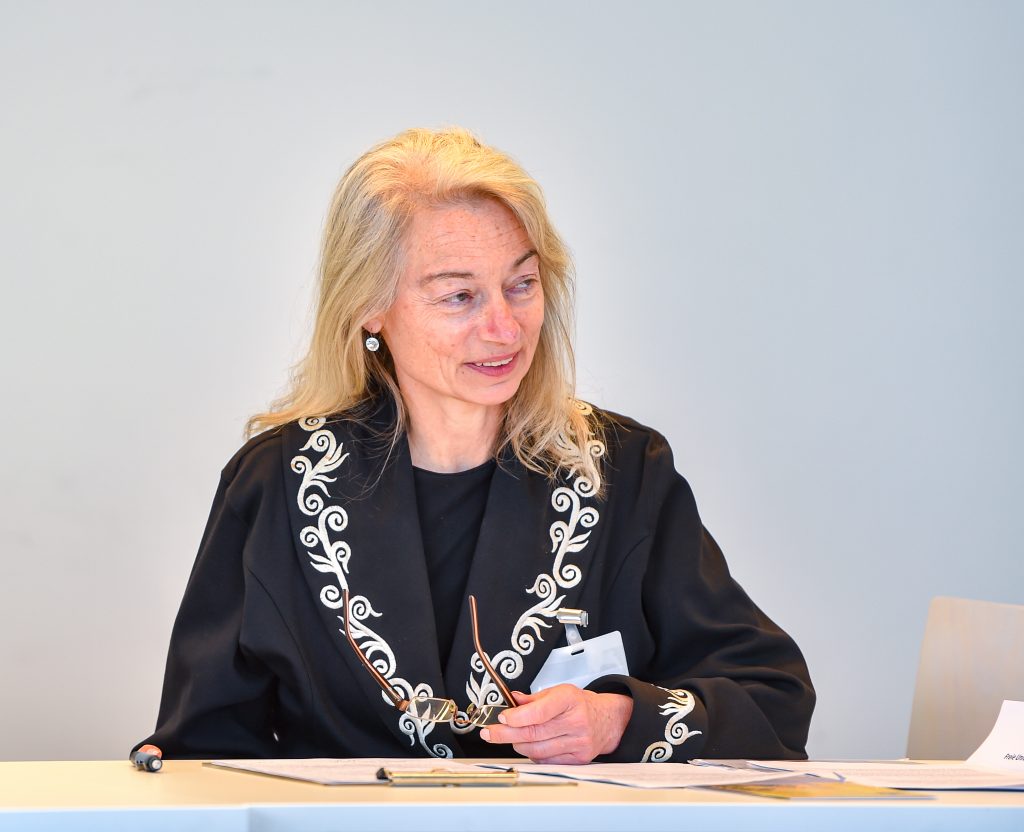
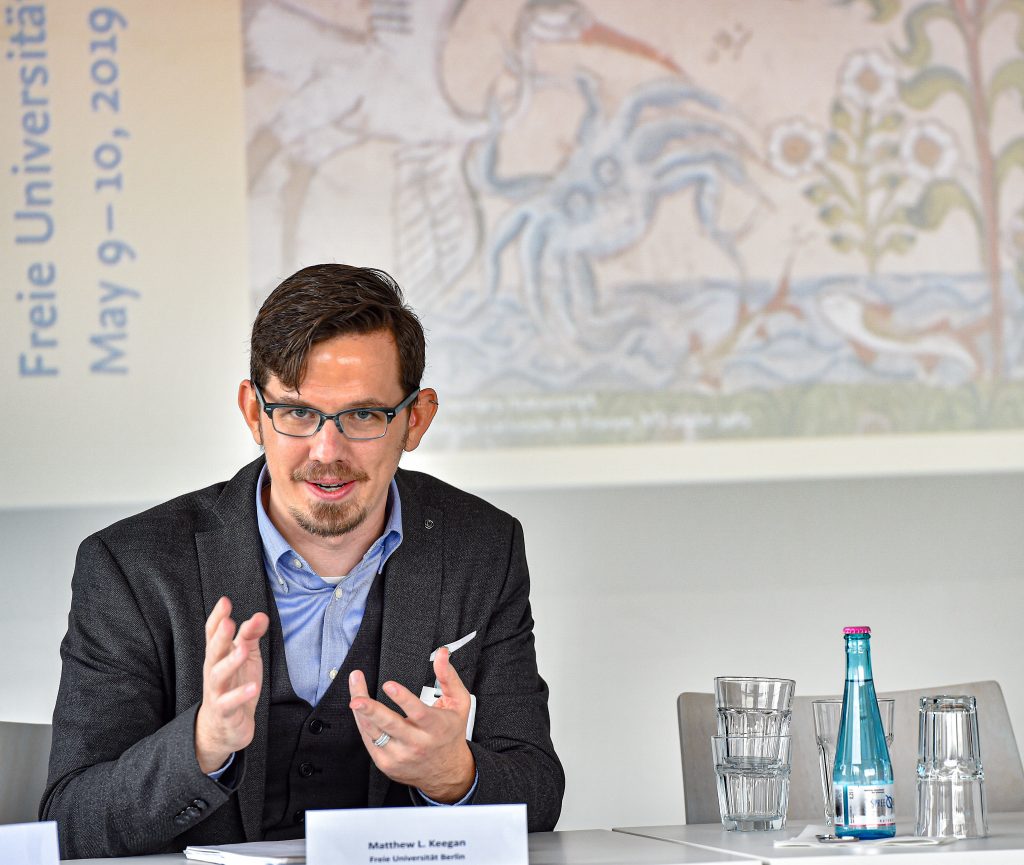
There are a number of famous examples of stories in Classical Arabic literature that feature talking animals, Kalīla wa-Dimna being the most prominent example. Kalīla wa-Dimna was translated and adapted into Arabic by Ibn al-Muqaffaʿ in the 8th century AD, but the first surviving manuscript witness is from the 13th century, almost half a millennium later. During that period, Arabic prose writing came into its own as a sophisticated tradition of writing. The copyists responsible for the surviving manuscripts ofKalīla wa-Dimnawere extremely creative in their adaptation and reproduction of the text, such that we refer to them as co-authors. These co-authors were familiar with a broad tradition of writing about talking animals that Kalīla wa-Dimna inspired.
Thus, if we want to understand the world in which the copyists of Kalīla wa-Dimna worked and the assumptions they had about how animal stories fit in the world of Arabic discourses, we need to understand this vibrant and diverse tradition of putting animals to imaginative work. The workshop made a significant contribution to this goal.
Each paper was given a full hour to allow for the ideas in each paper to be fully developed. Each participant gave an oral presentation, followed by a prepared response by a discussant who had read the paper beforehand and an open discussion. These discussions proved fruitful for making connections between different papers over the course of the workshop.
Many workshop participants also attended a series of pre-workshop seminars on specific Arabic texts dealing with animals. These workshops paved the way for meaningful discussions between students and workshop participants about animals in the Arabic literary tradition.
The workshop included excellent papers from local participants, as well as guests from abroad, including Geert Jan van Gelder, the Emeritus Laudian Professor of Arabic, who surveyed the genre of very short Arabic animal fables. Francesca Bellino, Assistant Professor of Arabic Language and Literature at the University of Naples, gave a paper on the animal stories of the Sicilian author Ibn Ẓafar. The participation of Jeannie Miller (University of Toronto) and Kevin Blankinship (Brigham Young University) was supported by the Dahlem Junior Host Program. They spoke, respectively, about al-Jahiz’s Book of Animals and al-Ma’arri’s various uses of talking animals across his oeuvre. Ignacio Sánchez (University of Warwick) presented a paper about the animal stories of the Brethren of Purity in which he showed that some animals were ventriloquizing earlier theological positions.
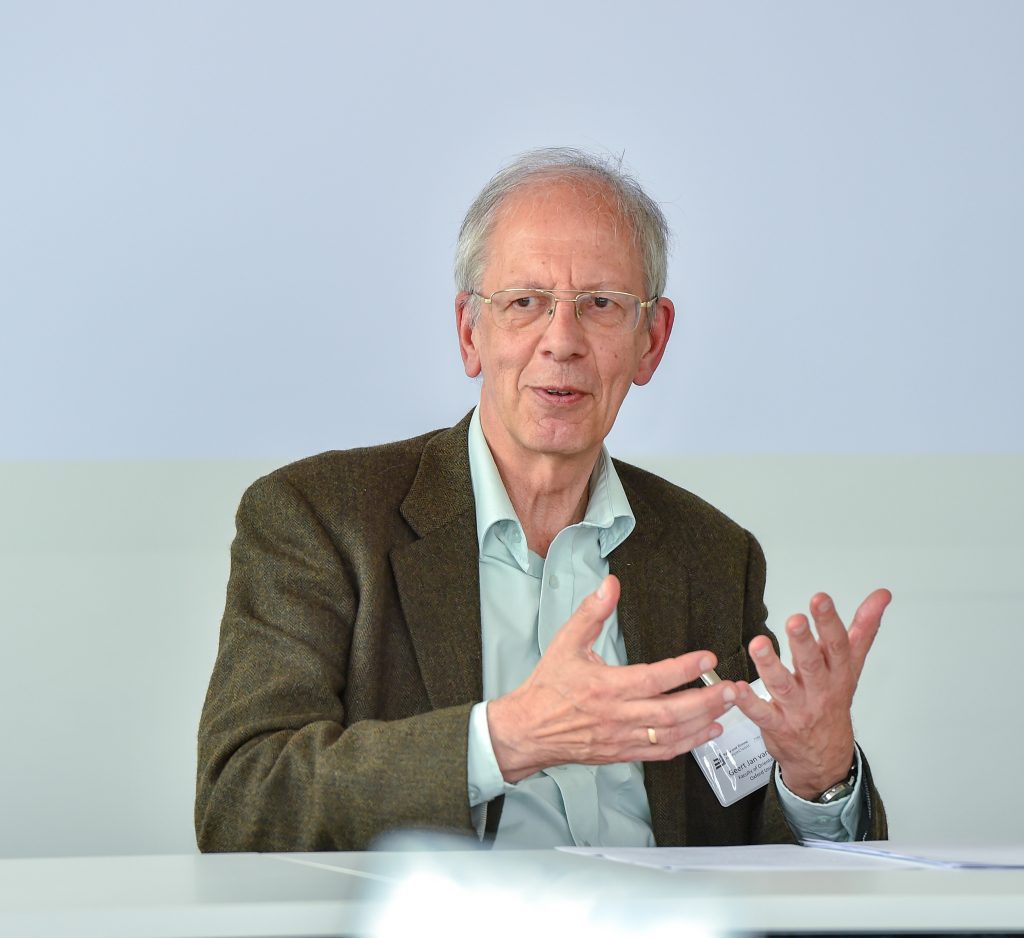
Graduate students and postdoctoral fellows at the Freie Universität also presented papers, including Khouloud Khalfallah, Ali Adnan Sakr, Guy Ron-Gilboa, and Johannes Stephan.
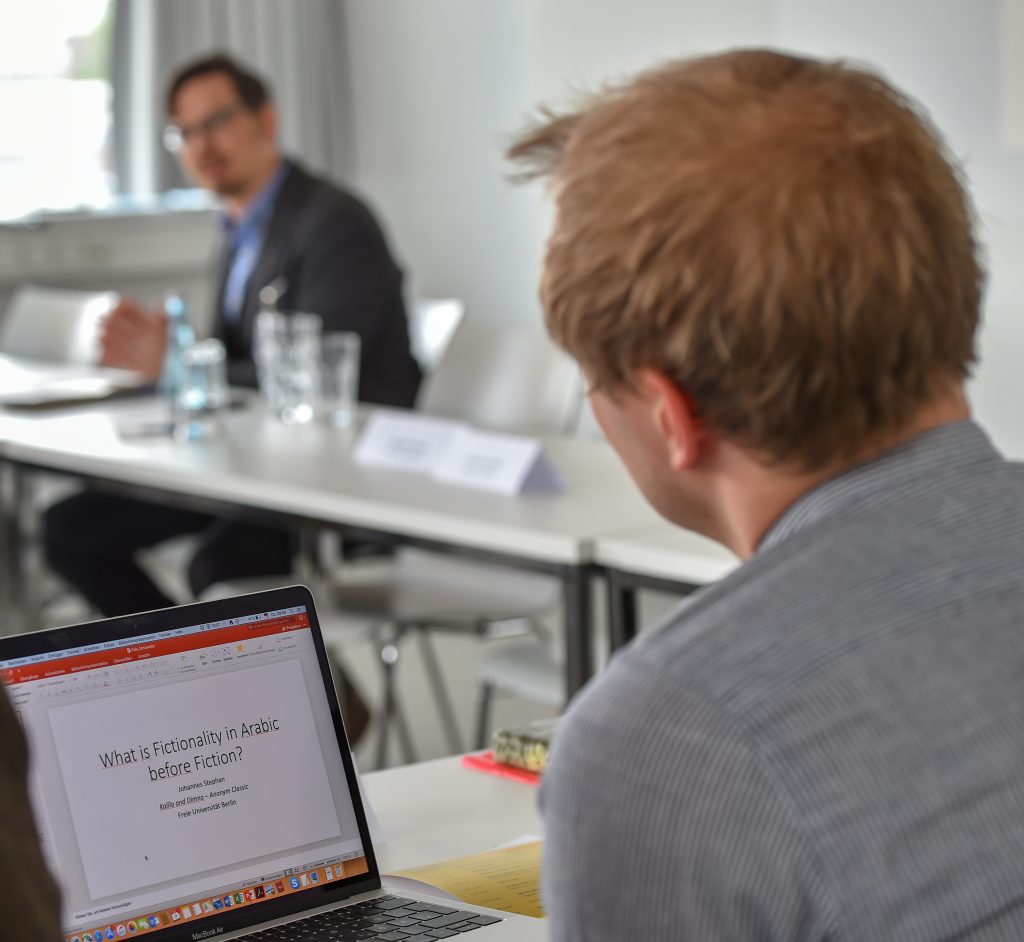
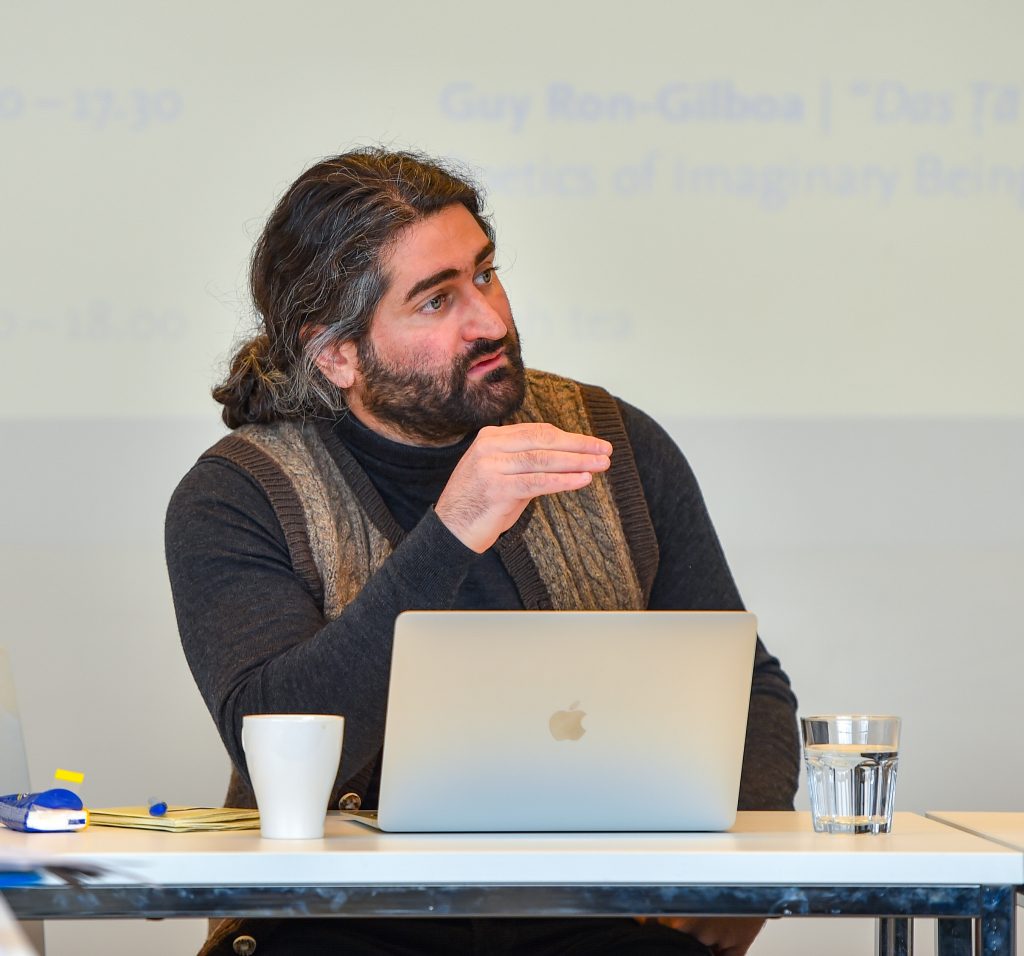
The workshop showed that the tradition of writing about animals in Arabic was vibrant and diverse. The participants discovered surprising connections between apparently quite different texts, and the format encouraged increasingly sophisticated questions about genre to be posed. The results of the workshop will be published as two special issues in the peer-reviewed Journal of Abbasid Studies.
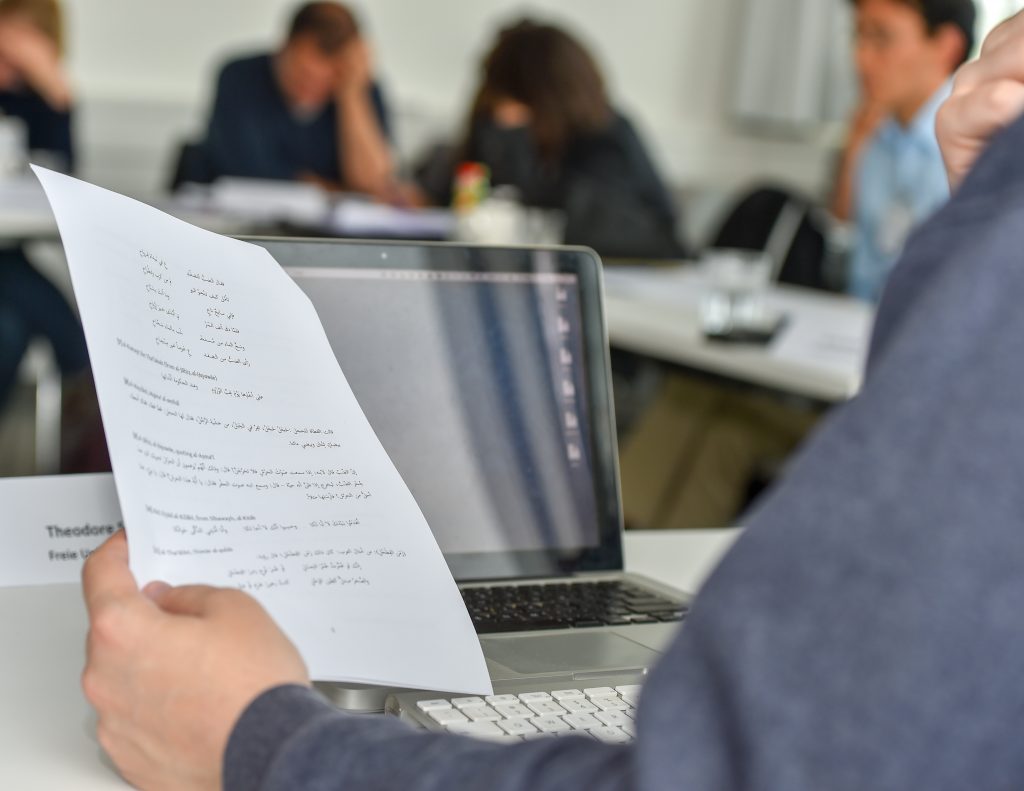
Mahmoud Kozae and Jan van Ginkel participated in the DH2019 conference in Utrecht
Matthew L. Keegan joins Barnard College as assistant professor.
We are happy to announce that our former postdoctoral researcher Matthew joins Barnard College of Columbia University as the Moinian Assistant Professor in Asian and Middle Eastern Cultures. Until July 2019, Matthew worked on the theorization of fictive writing in pre-modern Arabic within our project. We wish Matthew all the best for his future in New York City!
Find out more about Matthew on his Academia.edu profile.
Matthew Keegan and Johannes Stephan participated in a workshop on Conceptions and Configurations of the Arabic Literary Canon in Paris
A central aspect discussed at the workshop is the overlap of the concepts of canon, literary history, anthological literature and tradition. The question of canonicity is crucial to our project, as Kalīla and Dimna happened to be included and excluded from processes of canonization throughout its long history within the Arabic tradition. A complex process culminating in first critical editions in the early 19th century led to its acquiring the status of a classic within Arabic literature. Moreover, all versions of Kalīla and Dimna carry with it an internal textual history, as they all thematize in their introductory chapters the travelling of texts between different languages and localities, and hence may be seen as an early contribution to an Arabic literary canon.
AnonymClassic panel at the ISSN annual conference in Pamplona (Spain)
AnonymClassic team members Beatrice Gründler (PI), Matthew Keegan, Johannes Stephan, and Isabel Toral participated in the Annual Conference of the International Society for the Study of Narrative in Pamplona/Spain from May 30 to June 2, 2019, which gathered scholars of narrative studies from different disciplinary angles. Our panel under the title “Before Factuality/Fictionality History and Narrativity in Premodern and Early Modern Arabic Literary Tradition” was chaired by Johannes Stephan.
Our group formed the only Arabist panel. Furthermore, it was among one of the very few that engaged with non-Western and premodern literary traditions. In comparison to many contemporary narratological and rhetorical approaches, our contributions altogether stressed the importance of historicizing fictionality, rethinking it as a literary mode and a pragmatic category beyond European literatures, as well as relating it to the ongoing reformulation of philological activity in the digital age.
Recap by Johannes Stephan


